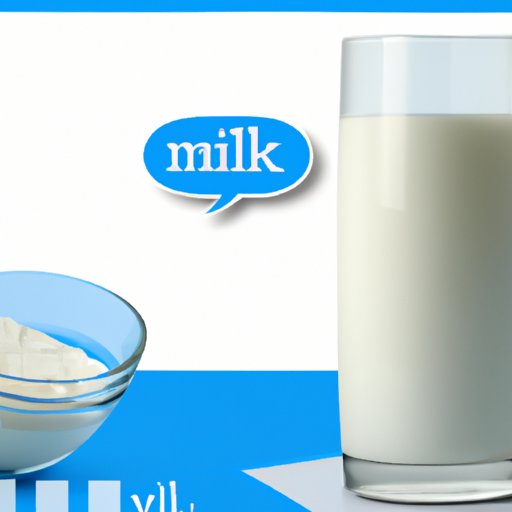Introduction
The debate around dairy consumption is one that has been raging for years. While some people argue that dairy products are essential to a balanced diet, others claim that they are unhealthy and unnecessary. So what’s the truth? In this article, we explore the pros and cons of dairy consumption in order to determine whether or not milk is healthy for you.
The Benefits of Calcium-Rich Dairy Products
When it comes to the nutritional value of dairy products, there is no denying that they are an excellent source of calcium. According to the U.S. Department of Agriculture (USDA), a single serving of cow’s milk contains 300 milligrams of calcium, which is more than 10 percent of the recommended daily allowance for adults. Other dairy products such as yogurt and cheese also contain high levels of calcium, making them valuable sources of this important mineral.
But how does this calcium benefit our health? Studies have shown that consuming adequate amounts of calcium can help to reduce the risk of osteoporosis, a condition characterized by weak bones that can become fragile and break easily. A study published in the British Medical Journal found that increasing calcium intake by 500 milligrams per day could reduce the risk of hip fractures in postmenopausal women by up to 30 percent.

Exploring the Impact of Milk on Human Health
In addition to its calcium content, dairy products are also rich in other nutrients such as protein and vitamins A and D. These nutrients have been linked to a number of health benefits, including improved immune function, stronger bones, and better cardiovascular health. A study published in the American Journal of Clinical Nutrition found that people who consumed three servings of dairy products per day had a lower risk of stroke compared to those who consumed less.
It’s important to note, however, that not all dairy products are created equal. Whole milk, for example, contains more fat and calories than low-fat or skim milk, which may be better options for those looking to maintain a healthy weight. Additionally, some people may be sensitive to lactose, the sugar found in milk, and may need to opt for lactose-free dairy products.
Unpacking the Debate Around Dairy Intake
While there are many potential benefits to dairy consumption, there are also some risks associated with it. Studies have suggested that dairy products may be linked to an increased risk of certain types of cancer, such as prostate and ovarian cancer. Additionally, some experts believe that consuming high amounts of dairy can lead to inflammation and digestive issues.
It’s important to remember that everyone’s dietary needs are different, and what works for one person may not work for another. Before making any changes to your diet, it’s best to consult with a doctor or nutritionist to determine what’s best for you.
Conclusion
In conclusion, the debate around dairy consumption is one that is still ongoing. While dairy products are an excellent source of calcium and other essential nutrients, there are also some risks associated with their consumption. Ultimately, the decision to include dairy in your diet should be based on an individual’s personal needs and preferences.
It is clear that more research is needed to better understand the potential benefits and risks of dairy products. Until then, it’s important to be mindful of your dietary choices and consult with a healthcare professional when making any changes to your diet.
(Note: Is this article not meeting your expectations? Do you have knowledge or insights to share? Unlock new opportunities and expand your reach by joining our authors team. Click Registration to join us and share your expertise with our readers.)
